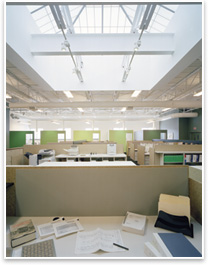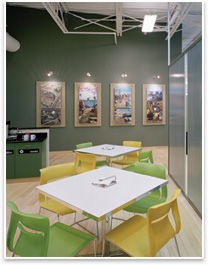
How do you . . . develop a sustainable practice? Summary: During its 40-year history, CBT/Childs Bertman Tseckares Inc., has placed sustainability at the core of its mission, and at the center of its design and business philosophy. Last month, Boston Mayor Thomas M. Menino recognized the firm for its efforts, naming it just one of 12 recipients of the city’s first annual Green Business Awards. The firm received the honor in the Green Business Practices category.
“It was about two years ago when we made a concerted push to get our own house in order,” Lewandowski says. “As creators of the built environment, we have a responsibility to learn, educate, lead, and practice in a socially responsive way.” The firm has instituted a number of improvements and amenities to make their historic office building more environmentally friendly, including a comprehensive recycling program, replacing disposable paper goods with china and stainless steel flatware, reducing electricity use, and installing dual-flush toilet valves.
During the morning program, 25 vendors displayed their green products and services for staff to review in a mini trade show. Lewandowski notes that they had to turn away vendors who wanted to participate. Later, staff took in a presentation on “Renewable Energy Systems for Commercial Buildings.” The day ended with CBT staff giving presentations on the sustainable projects on which the firm is currently working. He points out that the program is a great way to get the whole firm involved. The next step, he says, may be partnering with other firms or organizations. The Sustainable Design Committee has also, in association with Boston’s Green Roundtable, sponsored seminars on various aspects of sustainable design, including marketing the value of green buildings and the value of green design. It has also created a series of cards that feature info about green products for staff and clients. Lewandowski says: “To lessen our impact on the environment, we must think and act in a socially responsible manner in our daily personal and professional lives. A majority of environmental issues revolve around the use of natural resources and the creation of waste and, as change agents, we have the ability to greatly lessen our impact on the world.”
“These award-winners are shining examples of how businesses and residents are doing their part to support Mayor Menino’s vision for a sustainable Boston,” said James W. Hunt, chief of Environment and Energy for the City of Boston. “Whether it’s at home or in the office, these green practices demonstrate that sustainability is not only good for our environment and public health, but also is good for the bottom line.” |
||
Copyright 2007 The American Institute of Architects. All rights reserved. Home Page |
||
home
news headlines
practice
business
design
recent related
› Read about the AIA’s sustainability initiatives.
› Boston is the First Major U.S. City to Pass Green Building Zoning Code
› Kansas City Going Green (The AIA Angle)
› D.C. Requires Private Buildings to Go Green
CBT/Childs Bertman Tseckares Inc., founded in 1967, architecture, urban design, and interior design services. The firm has received more than 150 design awards.
Photos:
Photos 1 and 2: Twenty-five vendors pitched CBT staff members during Green Day. The team also enjoyed a presentation on renewable energy technology and shared information about sustainable work on the boards.
Photos 3 and 4: A.J. Martini Sustainable Redesign, Winchester, Mass., by CBT Architects, is an adaptive reuse of an existing two-story 20,000-square-foot warehouse into a corporate office and headquarters. The team is pursuing the pilot LEED-Silver rating for Existing Buildings.

 Best Practices
Best Practices  CBT is practicing what it preaches. The firm has made significant strides in integrating green principles into its business philosophy to make sustainability a way of life in the office and a tenet of their approach to design projects. The 200-member firm has 34 LEED-accredited professionals, sponsors a firm-wide Green Day, and supports a Sustainable Design Committee to advance the firm’s green efforts. The committee’s chair, Ken Lewandowski, AIA, LEED AP, notes that CBT employees share the notion that they need to take responsibility for sustainable design and inspire others to do the same.
CBT is practicing what it preaches. The firm has made significant strides in integrating green principles into its business philosophy to make sustainability a way of life in the office and a tenet of their approach to design projects. The 200-member firm has 34 LEED-accredited professionals, sponsors a firm-wide Green Day, and supports a Sustainable Design Committee to advance the firm’s green efforts. The committee’s chair, Ken Lewandowski, AIA, LEED AP, notes that CBT employees share the notion that they need to take responsibility for sustainable design and inspire others to do the same. CBT Green Day
CBT Green Day Going green in Boston (and elsewhere)
Going green in Boston (and elsewhere)